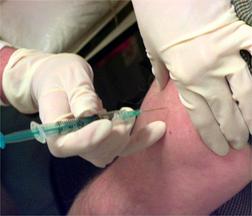Texas becomes first state to require meningitis vaccine

All students must show proof of immunization against bacterial meningitis by Jan. 7.
All entering or returning college students, under 30, in Texas will be required to have a bacterial meningitis vaccine or booster shot before beginning school in January 2012, according to Texas State Law S.B. No. 1107.
The immunization must have been received within the last five years and no later than 10 days prior to the first day of classes.
The act will be known as the Jamie Schanbaum and Nicolis Williams Act, following two high profile cases of bacterial meningitis in college students.
Mary Jones, nurse practitioner and coordinator of student health services for the St. Edward’s University Health and Counseling Center, said Texas has the most comprehensive law mandating the vaccine. Texas is the first state to require all college students to be vaccinated against meningitis.
Bacterial meningitis is a disease of the central nervous system that can progress within hours, according to the Centers for Disease Control and Prevention. The disease causes inflammation of the membranes around the brain and spinal cord. It is spread from person to person through exchange of respiratory droplets of the nose and throat. Symptoms may include a stiff and painful neck, fever, headache, and vomiting.
Inflammation can begin suddenly and must be treated immediately to prevent brain damage and death.
College students, especially those living in dormitories, have an increased risk of contracting bacterial meningitis, according to the CDC.
“College students live in tight spaces, which puts them at a higher risk of contracting the disease,” said Elizabeth Rowe, nurse practitioner and district manager of operations for MinuteClinic, a division of CVS, in Austin.
“They interact in tight dormitory spaces and social areas and are going to school in tight classrooms. Students are coming from all different walks of life, you never know what one might unknowingly bring,” Rowe said.
About 1,000 cases of bacterial meningitis occur in the United States annually; ten to fourteen percent of these cases are fatal, according to the CDC.
“Anywhere from 100 to 120 students contract the disease in a year,” Rowe said.
Entering students include first-time students, students transferring from other universities
and students who are re-entering classes after a break in enrollment for at least one fall or spring semester must also get the vaccine.
Jones encouraged students to check the Think page on the St. Edward’s website entitled “Meningitis: What You Need to Know,” which includes information on students who are exempt from the new law and what students must do to be in compliance with the law.
The vaccine can be received at most doctors’ offices and clinics, both private and walk-in. The deadline for proof of immunization is Jan. 7, 2012.
“It is good that Texas has taken the extra measure to cover all students,” Rowe said. “Students feel like ‘It won’t happen to me.’ The outcome can be death and debilitation.”






